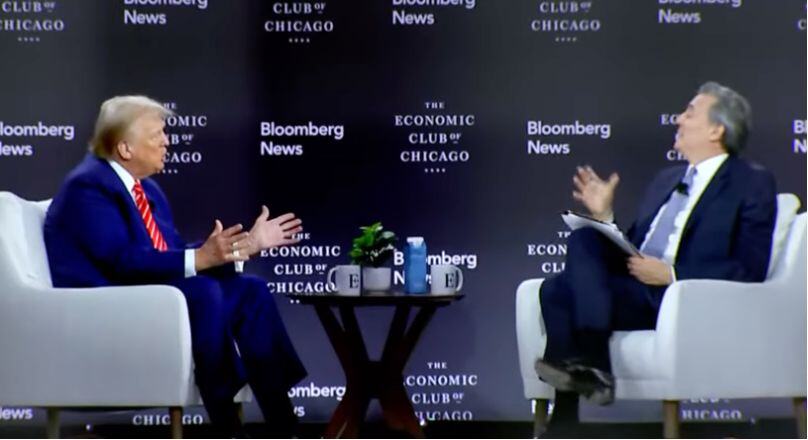
One of these men will be wrong
Flashback: In Oct 2024, Donald Trump was interviewed about his trade policies by Bloomberg's editor-in-chief, John Micklewait. Their discussion perfectly frames issues currently affecting capital markets.
Micklethwait’s take: Economists view tariffs as a tax on American consumers, which could lead to higher inflation, more debt, and an undermining of the dollar’s reserve status.
"Critics say your tariffs will end up being like a national sales tax."
"40 million jobs rely on trade. It counts for 27% of GDP. If you cut that off, that’s also going to have an effect on many, many business people here."
“How does it help you take on China turning all of your allies against you?”
Trump's take: Many countries take advantage of a low U.S. tariffs, hurting American jobs and threatening the dollar's reserve currency.
"To me, the most beautiful word in the dictionary is tariff, and it’s my favorite word."
"We’re going to protect those companies with strong tariffs, because I’m a believer in tariffs."
"The higher the tariff, the more likely it is that the company will come into the United States and build a factory in the United States so it doesn’t have to pay the tariff."
“What does The Wall Street Journal know? They’ve been wrong about everything. So have you, by the way. You’ve been wrong about everything.
“It must be hard for you to spend 25 years talking about tariffs as being negative and then have somebody explain to you that you’re totally wrong.”
Q&A on U.S. reserve currency:
Micklethwait: "You’ve said that if you lost the dollar as a reserve currency it would be like America losing a war, but if look at what you’re going to do in terms of protectionism, drive countries to use the other currencies and all that debt is going to lessen the united states’ status as the reserve currency, do you worry about that?"
Trump: "If a country tells me, ‘Sir, we like you very much but we’re going to no longer adhere to being in the reserve currency. We’re not going to salute the dollar anymore.’ I’ll say, ‘that’s okay, you’re going to pay a 100% tariff on everything you sell into the United States.’ …he will then follow it up by saying, 'Sir, it would be an honor to stay with the reserve currency.'"
A month into his term, Trump followed up on his tariff promises. Then our trading partners retaliated, sparking a trade war.
Tariffs and trade wars aren't new, but the last major trade war preceded the Great Depression. The Economist recently summarized the "worst damange" from that episode: "The Smoot-Hawley tariffs incensed America’s allies, who were infuriated by their economic punishment, but even more so by a sense of betrayal that it had been inflicted by an ally."
How do you see this trade war playing out?
A) Big boost for U.S. jobs and onshoring
B) Recession
C) Loss of reserve currency
D) Other

COMMENTS